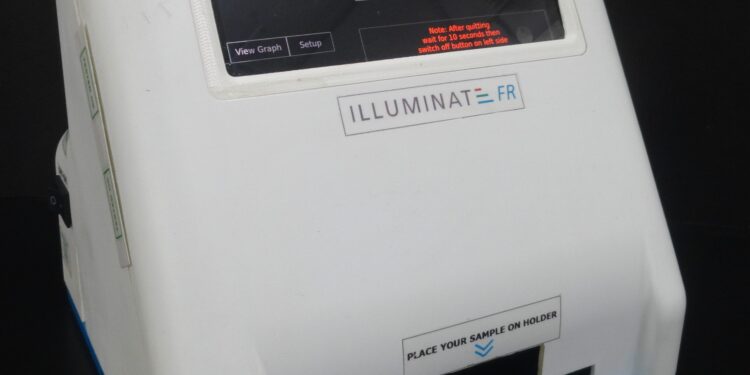Portable fluorescence reading device. Credit: Arnab Dutta
A paper-based platform developed by researchers at the Indian Institute of Science (IISc) and the Jawaharlal Nehru Center for Advanced Scientific Research (JNCASR) could help quickly detect the presence of antibiotic-resistant pathogenic bacteria.
One of humanity’s greatest challenges has been the proliferation of pathogenic bacteria resistant to antibiotics. Their emergence has been fueled by the misuse and misuse of antibiotics.
A handful of these bacteria, including E. coli and Staphylococcus aureus, have caused more than a million deaths, and those numbers are expected to rise in the coming years, according to the World Health Organization. Rapid diagnosis can improve the effectiveness of treatment.
“Usually the doctor diagnoses the patient and gives them medication. The patient then takes it for 2 to 3 days before realizing that the medication is not working and returns to the doctor. Even diagnosing that the bacteria is resistant to antibiotics from blood or urine tests take time. We wanted to reduce this diagnostic time,” explains Uday Maitra, professor at the Department of Organic Chemistry at IISc.
In an article published in ACS sensors, The Maitra laboratory and collaborators took up this challenge. They developed a rapid diagnostic protocol that uses a luminescent paper platform to detect the presence of antibiotic-resistant bacteria.
There are different ways in which bacteria become resistant to antibiotics. In one, the bacteria evolves and can recognize and eject the drug out of its cell. In another case, the bacteria produces an enzyme called β-lactamase, which hydrolyzes the β-lactam ring, a key structural component of common antibiotics like penicillin and carbapenem, rendering the drug ineffective.
The approach developed by the IISc and JNCASR team consists of incorporating biphenyl-4-carboxylic acid (BCA) within a supramolecular hydrogel matrix containing terbium cholate (TbCh). This hydrogel normally fluoresces green when exposed to UV light.
Diagram illustrating the detection/differentiation of antibiotic-resistant bacteria. Credit: Arnab Dutta
“In the lab, we synthesized an enzyme substrate by attaching BCA to the cyclic ring (β-lactam) that is part of the antibiotic. When you mix it with TbCh hydrogel, there is no green emission because the sensitizer is ‘masked.'” says Arnab Dutta, a Ph.D. student in the Department of Organic Chemistry, IISc, and lead author of the paper.
“In the presence of the β-lactamase enzyme, the gel will produce a green emission. The β-lactamase enzyme in the bacteria is the one that opens the drug, destroys and unmasks the BCA sensitizer. Thus, the presence of β-lactamase is indicated by a green emission.
Luminescence signals the presence of antibiotic-resistant bacteria and luminescence intensity indicates bacterial load. For non-resistant bacteria, the green intensity was found to be extremely low, making them easier to distinguish from resistant bacteria.
The next step was to find a way to make the technology inexpensive. The diagnostic instruments currently used are expensive, which drives up the price of tests.
The team collaborated with a Tamil Nadu-based company called Adiuvo Diagnostics to design a custom, portable, miniature imaging device, named Illuminate Fluorescence Reader. Infusing the hydrogel in a sheet of paper as a carrier reduced the cost significantly. The instrument is equipped with different LEDs that emit UV radiation as needed. The enzyme’s green fluorescence is captured by an integrated camera and a dedicated software application measures the intensity, which can help quantify the bacterial load.
The IISc team teamed up with Jayanta Haldar’s research group at JNCASR to verify their approach on urine samples. “We used samples from healthy volunteers and added pathogenic bacteria to mimic urinary tract infections. The result was obtained in two hours,” says Maitra.
As a next step, the researchers plan to partner with hospitals to test this technology with patient samples.
More information:
Arnab Dutta et al, Increasing antimicrobial resistance surveillance: rapid detection of drug-resistant bacteria expressing β-lactamase using sensitized luminescence on paper-based hydrogel, ACS sensors (2023). DOI: 10.1021/acsensors.3c02065
Provided by Indian Institute of Science
Quote: Researchers develop a protocol for rapid detection of antibiotic-resistant bacteria (February 15, 2024) retrieved February 15, 2024 from
This document is subject to copyright. Apart from fair use for private study or research purposes, no part may be reproduced without written permission. The content is provided for information only.



